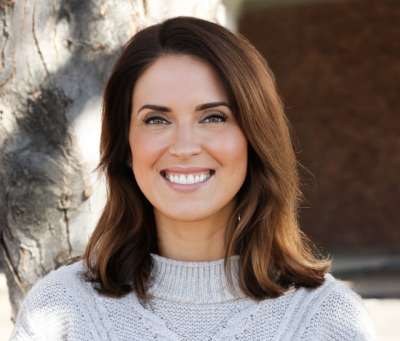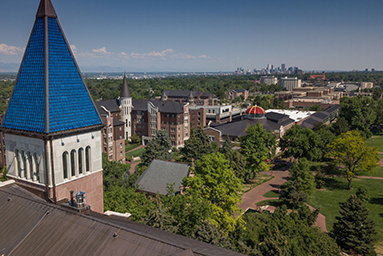Rhiana Holmes (MA '17): Advancing Compassionate, Culturally Responsive Mental Health Care
As part of our 50th anniversary alumni series and in recognition of Mental Health Awareness Month, we are proud to spotlight Rhiana Holmes (MA '17), a graduate of the International Disaster Psychology: Trauma & Global Mental Health (MAIDP) master's program at GSPP. This year also marks the 20th anniversary of the International Disaster Psychology: Trauma & Global Mental Health master’s program—a milestone that celebrates two decades of preparing culturally responsive and globally minded mental health professionals. Rhiana's journey reflects a deep commitment to serving diverse communities and addressing the nuanced needs of caregivers, especially mothers, during times of crisis and transition.
Rhiana’s path into global mental health began early. Raised by parents passionate about travel and culture, she developed a lifelong interest in international experiences. "The universe has always brought me back to some sort of international work," she says, recalling formative experiences at a therapeutic boarding school and on a mission trip supporting children of American soldiers in Austria. Discovering GSPP's MAIDP program felt like destiny. "I just completely fell in love with it... I try to convince people to apply all the time."
Her time in the program profoundly shaped her professional identity. "I don't think I realized how much it shaped me until I got out of school," she reflects. "My knowledge of how trauma shows up—not only in general, but across cultures even within the U.S.—has been a really powerful tool." A summer internship in Cambodia deepened her understanding of how cultural differences influence mental health, from Buddhist perspectives on wellness to the absence of certain emotional expressions in language. Rhiana credits influential faculty, including Judith Fox, PhD (then-Director of the MAIDP program) and Gwen Mitchell, PsyD (now Co-Director), for shaping her culturally attuned approach.
One instructor left a lasting impression: Curt Drennen, PsyD, currently adjunct faculty. His disaster mental health course, though focused on large-scale response, provided insights that Rhiana carries into clinical practice every day. "I remember one thing that I use all the time that he told us: 'anger is a mask for fear.' I probably say that at least once a day to my clients." His teachings have helped her look beyond surface emotions and connect more deeply with those in distress.
Today, Rhiana balances private practice with community and forensic work, including roles at Community Reach Center, Westminster Wellness Court, and the Department of Corrections. The cultural humility fostered in the MAIDP program continues to inform her practice. "I’ve taken that advice to heart. It’s probably one of the best pieces I ever got out of the program," she says, referring to the importance of helping clients find therapists who share their cultural background—or when that isn’t possible, acknowledging those differences openly and respectfully.
Supporting parents and caregivers is central to Rhiana’s practice—a particularly resonant theme as Mother’s Day approaches. Currently, about 30% of her caseload includes expecting mothers navigating relational shifts and emotional challenges. "Teaching moms what boundaries look like, how having a baby is going to inherently change your relationship with your partner... but that you can set reasonable boundaries and be even more fulfilled—that’s a very unique challenge."
Rhiana emphasizes the critical role of community, especially for caregivers. "Use your community, rely on your community," she tells clients. "It takes a village just to survive generally—you just need your people around you.” She has seen firsthand how isolation can prolong therapeutic work. "People will stay in therapy forever if they do not have their community... I have never seen it not be true."
For those unsure how to find connection, Rhiana offers practical suggestions. "Go to your church, your temple, your mosque," she recommends, noting the power of cultural and faith-based spaces. She also encourages clients to seek local connections. "Recreation centers, Meetup, platonic friend groups—I tell people to join a Bachelor watch party," she says with a laugh. "I have had clients graduate from therapy so quickly just by joining watch parties for reality TV—it’s like magic." Even casual, everyday interactions can make a difference. "Go to the same coffee shop and introduce yourself to the barista," she suggests. "It doesn’t have to be complicated."
Burnout is a reality for many in trauma-focused fields, and Rhiana emphasizes the importance of self-care and boundaries—wisdom she also shares with emerging professionals. "When I’m burnt out, learning a new therapy intervention makes me feel unstuck every single time," she says. Equally important, though, is knowing when to set firm boundaries when personal and professional demands overlap. Rhiana also embraces playful activities to stay grounded, turning to what she calls "inner child work." "Watching old cartoons or movies you loved as a kid—that stuff is powerful. It makes you feel grounded to who you are."
Looking ahead, Rhiana remains committed to advancing equity in the field. "I really hope universities make more scholarships available for [marginalized] communities," she says. While she’s seen progress, barriers remain. "Insurance is absolutely the biggest barrier to people engaging in mental health care," she notes, advocating for universal health care to improve access and outcomes. She worries about shortcuts like online prescriptions and social media advice. "People are not really getting person-centered care. And if it's not person-centered, it's not evidence-based."
At the core of her philosophy is resilience. "I like the imagery of making your plate bigger," Rhiana shares. "As we age, we inevitably carry more stress, so proactively calming your nervous system becomes key." Routine—emphasized in the MAIDP program—remains central to her approach. "Giving your body a sense of normalcy in the face of stress is really powerful."
As Mental Health Awareness Month invites reflection, Rhiana encourages people to take small, meaningful steps. "Being an advocate is telling people where to look for mental health resources," she says, urging individuals to use tools like insurance and therapist directories thoughtfully. "If you trust your provider, your health outcomes are better."
Whether supporting new mothers, navigating complex trauma, or mentoring future clinicians, Rhiana Holmes embodies GSPP’s mission: to bring culturally aware, compassionate care to communities worldwide.
To hear more of Rhiana’s reflections on motherhood, mental health, and the importance of community, listen to her recent podcast episode from March, where she discusses how gender, age, and life stage shape treatment planning and shares advice on finding meaningful connection.



